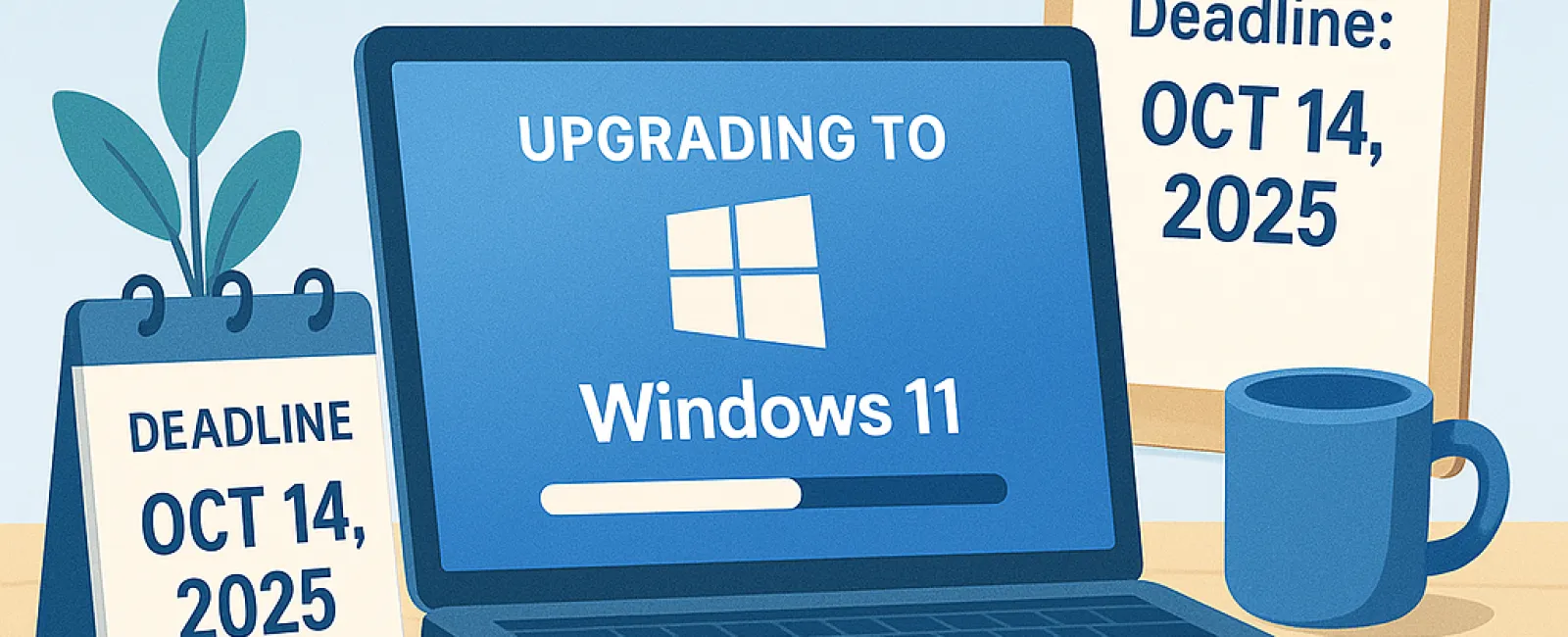June 23, 2025
If your business computers are still running Windows 10, time is running out fast.
As of October 14, 2025, Microsoft will officially stop supporting Windows 10. This means no more security updates, bug fixes, or technical assistance.
What every business owner must realize is that the risk of waiting goes beyond just eventually needing to upgrade.
The real cost lies in what delays could expose you to right now.
"We'll Handle It Later" Is A Costly Mistake
We understand—upgrading every device isn’t a budget line you look forward to. It’s tempting to push it off until something fails.
But here’s what procrastination truly costs you:
1. No More Security Safety Net
After Microsoft ends Windows 10 updates, new security risks become your sole responsibility.
Hackers target outdated systems because they’re easy prey—it’s like locking your front door but leaving all the windows open.
A single security breach could cost thousands or even jeopardize your entire business.
2. Compatibility Problems With Software And Hardware
Many critical business applications—like accounting software, CRMs, and industry-specific tools—are already dropping Windows 10 support.
If your systems fail in the middle of a project or crash during an important client presentation, what’s the cost?
And it's not only software that’s affected.
New printers, peripherals, and security devices may no longer work properly with your outdated operating system.
3. Decreased Productivity
Old systems run slower, crash more often, and frustrate your team. Even minor delays accumulate, reducing efficiency, morale, and your competitive edge.
If each employee loses just 10 to 15 minutes daily due to tech issues, imagine the impact on your business over a month.
4. Emergency Upgrades Are Costlier
Waiting for a system failure or lockout triggers panic-driven spending:
● Urgent hardware purchases
● Expedited IT service fees
● Business disruptions during replacements
Planning ahead saves you from scrambling—and overspending—later.
5. Risk Of Compliance Violations
If your business manages sensitive information or must comply with regulations like HIPAA or PCI-DSS, running unsupported systems could lead to fines or legal trouble. Most regulatory standards require up-to-date security—Windows 10 won’t meet these after October.
How Savvy Business Owners Are Preparing Today
They’re not just upgrading devices early—they’re using this opportunity to:
● Assess which devices need replacement
● Optimize software and tools
● Strengthen cybersecurity defenses
● Plan IT budgets strategically for 2025
Tips For A Seamless Upgrade
Here’s our advice:
● Check device compatibility - Not all machines support Windows 11. Identify which need replacement.
●
Review your applications - Ensure your essential software runs smoothly on Windows 11 or newer platforms.
● Plan your hardware budget now - Avoid supply chain delays later.
● Work with an experienced IT partner - We manage your upgrade smoothly from start to finish—no downtime, no surprises.
Don't Wait Until The Last Minute To Act
Delaying until October will only increase your costs—in money, stress, and lost opportunities. We help small businesses upgrade smartly: with careful planning, smooth execution, and future-proof solutions.
Click here or call us at (949) 537-2909 to schedule your FREE 10-Minute Discovery Call. We'll guide you through identifying what needs upgrading, what can stay, and crafting a transition plan that keeps your business running seamlessly before the deadline.



